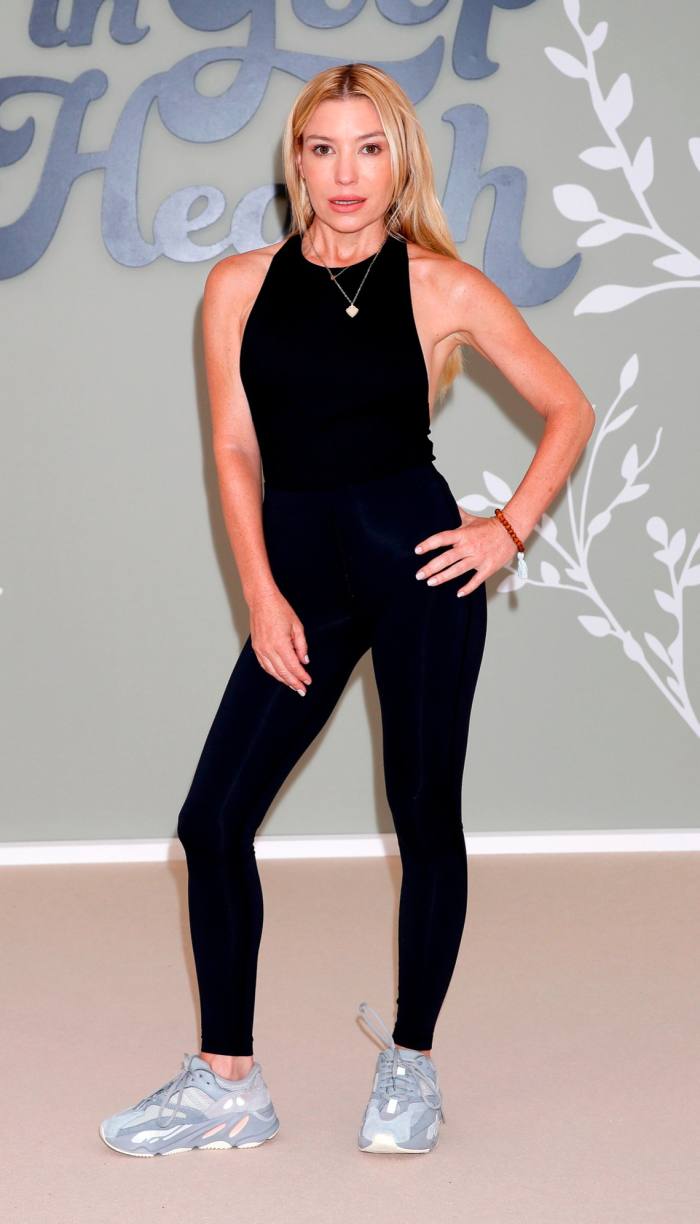When your virtual fitness instructor becomes your BFF
The announcement that my favourite yoga app, Down Dog, is casting for new models to lead its virtual classes has prompted a flurry of requests. “It would be nice to see more plus-sized models,” suggests one user. Another asks for “older models”, who might make him feel less self-conscious. There are conversations about the need for more diversity.
Mostly, however, the users are saddened by the fact that “Erin”, the longtime face of Down Dog, may no longer be our savasana pal. “I’m only in this app for Erin,” reads one response on Instagram.
Who you train with is an emotive subject in a virtual fitness market which, according to the app Dr Muscle, is expected to be worth $15.2bn in 2028. Fitness apps, which range from tracking apps to instructive platforms, boomed during the pandemic and the habit has stuck as people find virtual training more convenient, less exposing and invariably cheaper than the gym. Down Dog, founded by Benjamin Simon in 2015, uses pre-recorded routines to offer a range of practices for different competencies and needs. It has more than 500,000 subscribers (middling compared to Peloton’s 5.9mn members), but inspires tremendous loyalty: more than 100,000 users complete a practice every day.
I had assumed that the serene yogi in a crop-top who helps guide each practice was an AI creation: Erin has such a blank robotic charm. As the classes are guided by a range of different voices for you to choose from, it seemed that she, too, must be some kind of fancy avatar. Further probing revealed, however, that Erin Gilmore is a real-life “yoga, meditation, breathwork teacher and mentor” in San Francisco, who sees a “healer”, has “big feelings” and considers the Barbie movie a “beautiful work of art”. She tells me the app is simply “expanding the options while I’m pregnant with my second baby” and she “is still working with [Down Dog] behind the scenes”.
What kind of relationship do you have with your trainer? And how invested can you be with someone you see only online? An informal Insta-survey reveals a febrile landscape of one-way love, for both men and women, in which the cult of personality is key. Peloton sparks the most ardent flames of adoration, especially for Tunde Oyeneyin, a bestselling author and keynote speaker; Rad Lopez, a boxer; Cody Rigsby, a fitness “guru”; and Jess Sims. There are others. “I will follow Robin Arzon anywhere,” says one devotee of Peloton’s head instructor, while FT Weekend’s Shannon Gibson prefers “an emotional lap” with Adrian.
Tracy Anderson’s acolytes are so obsessed with her “fitness methodology” that they are shelling out an extra $5,500 to “reserve” a mat in her real-life classes (on top of the $90 monthly subscription) and describe themselves as “Tamily”. Online users are similarly devoted. “I feel like Tracy Anderson comes to my flat and works out with me,” says Kerri Lipsitz, an interior designer. Other users love the post-class online “locker” chat.
Mindful movement and meditation maven Melissa Woods also comes up often, usually followed by the words: “I love her”. Another writer describes her “inordinately close bond” with Pilates instructor Julie Pujols, “the French girl go-to who looks like Brigitte Bardot”, whom she has met once but thinks of “like my friend”.

A few people (like me) want to punch in and out of classes with no engagement. Others seek a far deeper connection on the mat. Dr Amina Abdeldaim, an allergist in New York, speaks for many when she says: “If it doesn’t seem like I would be friends, I don’t exercise with them.” Others go even further. Of Nike’s Kirsty Godso, one person says: “I have a much better relationship with KG than I have with most people in my life.”
The most favoured instructors among my poll group are friendly, motivating and boast an aspirational body-type. Users want a glimpse of fallibility: “I like that she acknowledges the class is painful”, says someone of Julie Pujols. But they hate a faker. “One trainer pretends to be really out of breath, I suspect to make us feel better,” says one user of the Nike app. “That really fucks me off.”
Age can also be an advantage: “a slightly older trainer who looks great, gives me hope.” And while there doesn’t seem to be a huge appetite for plus-size instructors (on the contrary, many favourites are intimidatingly bionic), there is a general aversion to trainers who don’t seem authentically athletic — “as if the demonstrators are models and not sports people” — or where they look too underweight. Given that fitness is already so emotive, like food, there is an unspoken rule that a trainer should inspire; and while people want drive and motivation, they want trainers who are kind.
Personally, I want a trainer to look fantastic, show the techniques clearly and push me to meet new goals. I would never join a chat post workout, and doubt I would follow a virtual trainer outside the class. I’ll be curious to see the new models that Down Dog next employs. The beauty and success of Erin, I now realise, was that I barely thought of her at all.
Email Jo at [email protected]
Find out about our latest stories first — follow @ftweekend on Twitter
This story originally appeared on: Financial Times - Author:Jo Ellison



























